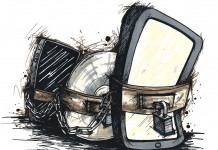 On the SF Novelists Blog, author Steven Harper Piziks has posted a rant about e-books and e-publishing that is attracting a fair amount of discussion.
On the SF Novelists Blog, author Steven Harper Piziks has posted a rant about e-books and e-publishing that is attracting a fair amount of discussion.
Piziks brings up the same refrain that e-reading critics have repeated since time immemorial: nobody wants to read on a computer screen, and e-reading devices suffer from a "chicken and egg" dilemma where there needs to be a critical mass of e-books to support e-readers and vice versa.
To solve this dilemma, Piziks proposes using a "cellphone" business model for e-book readers: give basic readers away for free, just as cellphone providers subsidize their customers’ cellphones.
On the one hand, this is certainly attractive from the consumer standpoint. Who would not like a free e-book device? But on the other hand, cellphone providers are able to give away the phones because they know they will make enough back on cellphone service over time that the cost is a drop in the bucket.
But whereas most giveaway cellphones are in the $50 to $100 range unsubsidized, we still have not reached the point where dedicated e-book readers can be had for under $200 to $300 yet. It would be necessary to sell an awful lot of e-books to make that amount back.
And on the gripping hand, there is already a burgeoning e-book market with which Piziks is either unfamiliar or unconcerned. If Steve Pendergrast’s estimates are to be believed, there may be more people reading on the iPhone and iPod Touch (and that’s not even mentioning the Palm, Windows Mobile, and other eReader-supported platforms) than on the Kindle.
Literary Devices
Certainly Fictionwise and eReader (and, come to think of it, Baen) have far more than just a handful of titles in their stores—but to listen to Piziks, who claims that "[a] full-blown market for e-books doesn’t exist," we would seem to be in an e-literary wasteland.
We’ve seen this pattern before. It was the coming of the first widely-adopted multifunction device, the Palm Pilot, that moved e-books from a theoretical concept espoused mainly by Project Gutenberg to a commercial reality. Now we are seeing a new wave of multifunction devices in the millions-selling iPhone and iPod Touch.
In a sense, the readers already are getting out there for "free"—or at least, at a very low marginal cost. It does not cost anything extra to download eReader onto the gizmo that you originally bought solely to play mp3s or make phone calls, after all.
Time will tell where the e-book goes from here, but I’m pretty sure they would still have a bright future even if the Kindle went bust tomorrow.

































Mr Piziks is wrong. When ebook displays get cheap enough (and they will), and when they become just another consumer gadget like a mp3 player (they will), and when readers realize how much money they can save by buying e rather than p (they will), the market will go absolutely nuts.
This guy has no clue what he’s talking about. I’m reading on my iPod Touch these days, and I am loving Fictionwise right now. All sorts of unknown (by me) authors to discover. And they have this great discount scheme where they refund you 100% of the price for some books—in store credit. It is great value especially if you plan to buy more books anyway. I am reading a lot and having tons of fun.
I’m one of the many who read on my iPod Touch.
And to comment, if all the e-book sellers adopted ePub, that would help. Richard mentioned MP3 players – they have a standard format – e-books will too…. eventually
I read on my iPAQ 111 handheld with Mobipocket, and love it.
No, we aren’t yet in a spot where the market is booming, but it’s just about ready to explode.